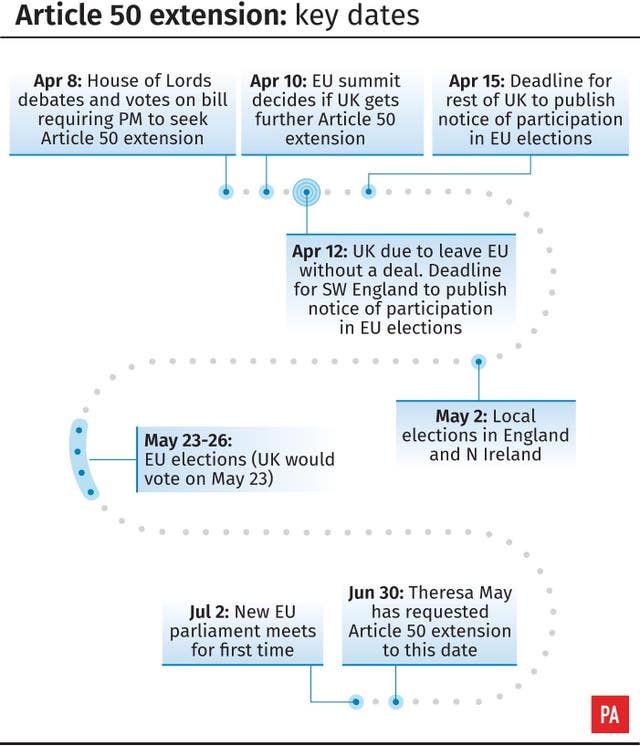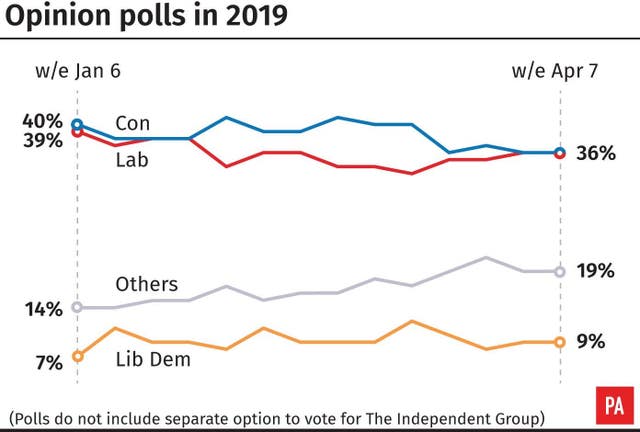May to meet Merkel and Macron for last-minute Brexit talks on eve of key summit
The Prime Minister will set out her rationale for delaying the UK’s withdrawal from the EU to the end of June.

Theresa May is to make a whistle-stop trip to Berlin and Paris for last-minute talks with Angela Merkel and Emmanuel Macron on the eve of a summit which will determine the future of Brexit.
The leaders of the 27 remaining EU nations have been summoned to Brussels for an emergency meeting of the European Council on Wednesday, just two days before the UK is due to leave under current plans.
The Prime Minister’s visits on Tuesday appear to make it unlikely that any compromise Brexit deal thrashed out with Labour will be put before MPs ahead of the summit, with no face-to-face talks currently scheduled with the official Opposition.
Downing Street said that there were contacts with the opposition over the course of Monday and it was hoped that further talks would be arranged soon.
Unconfirmed BBC reports suggested that the Government has made an updated offer to Labour, stopping short of a customs union, but proposing a “lock” to prevent a future Conservative leader unpicking any agreement.
Mrs May is expected to set out in her talks with the German Chancellor and French President the rationale behind her request for a delay to the date of Brexit from April 12 to June 30.
She spoke with Dutch PM Mark Rutte, Malta’s Joseph Muscat and European Council President Donald Tusk by phone on Monday, and was due to speak with other EU leaders in the run-up to the crunch meeting, where their unanimous agreement will be needed to avoid the UK leaving without a deal on Friday.
Mr Rutte said that it would be “crucial” for the EU27 to know “when and on what basis” the UK will ratify its Withdrawal Agreement. And he said they would need assurances of “sincere co-operation” from London before granting an extension.

Mr Tusk has recommended a one-year extension to the Brexit process, with a break clause allowing an earlier departure if a withdrawal deal is ratified in Westminster.
France has warned that the UK must provide a plan with “clear and credible political backing” in Westminster if it is to receive a further extension to the two-year Brexit process, which was initially intended to end on March 29.
But Mr Macron has also promised that his country “will never abandon Ireland”, in an apparent indication that he will stop short of insisting on a no-deal Brexit on Friday.
Tuesday’s weekly meeting of Cabinet has been cancelled due to Mrs May’s travels, with no rescheduled date yet announced. A number of Cabinet ministers attended Downing Street for a scheduled meeting of the EU sub-committee on Monday.

Setting out Mrs May’s plans for talks with fellow leaders, the Downing Street spokeswoman said: “The Prime Minister set out a clear ask to Donald Tusk on Friday in terms of an extension, and she believes it’s important that she can set out the rationale for that ask as widely as possible in the lead-up to Council.”
The Prime Minister has angered Tories by holding talks with Labour, with Brexiteers including Boris Johnson concerned that she will accept a customs union as the price for a deal with Jeremy Corbyn.
Negotiations have stalled after Labour said the Prime Minister refused to set out any changes to her Brexit red lines.
In a video message recorded in her Chequers country retreat at the weekend, Mrs May said both sides in cross-party talks will have to compromise.
The Prime Minister acknowledged that she could not see the Commons accepting her deal in its current form and MPs would not agree to a no-deal exit.
If no deal can be reached with Labour, Mrs May has committed to putting a series of Brexit options to the Commons and being bound by the result.
She hopes to have a solution ratified in time to allow the UK to leave the EU by May 22, avoiding the need to take part in European Parliament elections the following day.
But Mr Johnson warned that Tory MPs will not allow Mrs May to “surrender” to Mr Corbyn, who is demanding involvement in a post-Brexit customs union arrangement with the EU as part of the price for Labour support.
“If the UK were to commit to remaining in the customs union, it would make a total and utter nonsense of the referendum result,” said the former foreign secretary in his regular column in the Daily Telegraph.
“To agree to be non-voting members of the EU, under the surrender proposed by Jeremy Corbyn – it cannot, must not and will not happen.”
Shadow Brexit secretary Sir Keir Starmer said that, at this stage, the ball was “in the Government’s court”.
He told the BBC: “We had exchanges over the weekend but not talks – there are no scheduled talks yet but I have no doubt things will develop today.
“At the moment we’re waiting to see what the Government is putting in the table as a proposal.
“All they have done so far is to indicate various things but not to change the Political Declaration, so the ball is in the Government’s court.
“We need to see what they come back with and when they do we will take a collective position on that.”
In a further sign of the constraints on Mrs May, Brexiteer Cabinet minister Penny Mordaunt warned that a long delay to Brexit would be unacceptable to the public and businesses which were already “having to prepare for a whole raft of eventualities”.
“For me, the critical thing is that we leave, we do it swiftly, we don’t get locked into fighting European elections,” she told City AM.
Solicitor General Robert Buckland said “something approximating a customs arrangement or customs union would be the most likely outcome” of the process.
He told BBC Radio 4’s Westminster Hour: “It’s not perfect but, frankly, in this particular hung Parliament none of us can get perfection, we need to compromise.”
Meanwhile, the House of Lords was continuing its consideration of Yvette Cooper’s backbench Bill forcing the Prime Minister to request a Brexit extension rather than leave the EU with no deal.
And EU chief Brexit negotiator Michel Barnier was travelling to Ireland for talks with Taoiseach Leo Varadkar.





